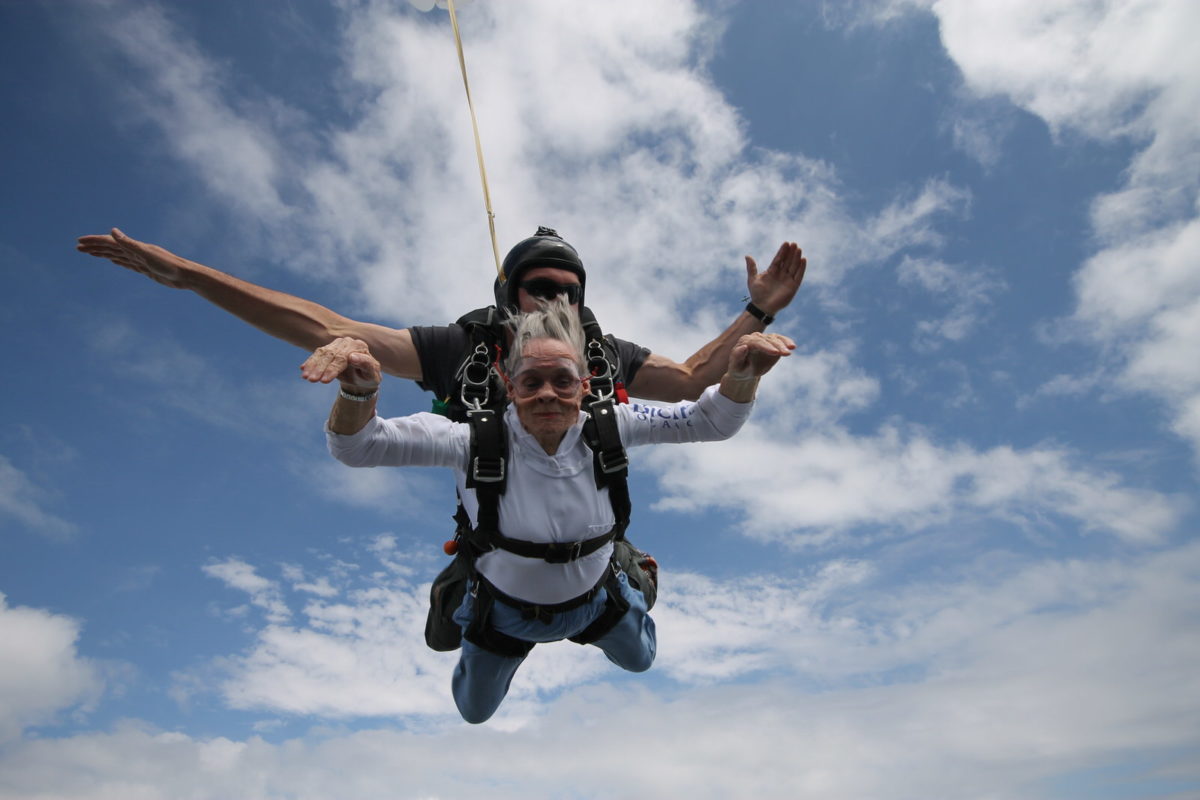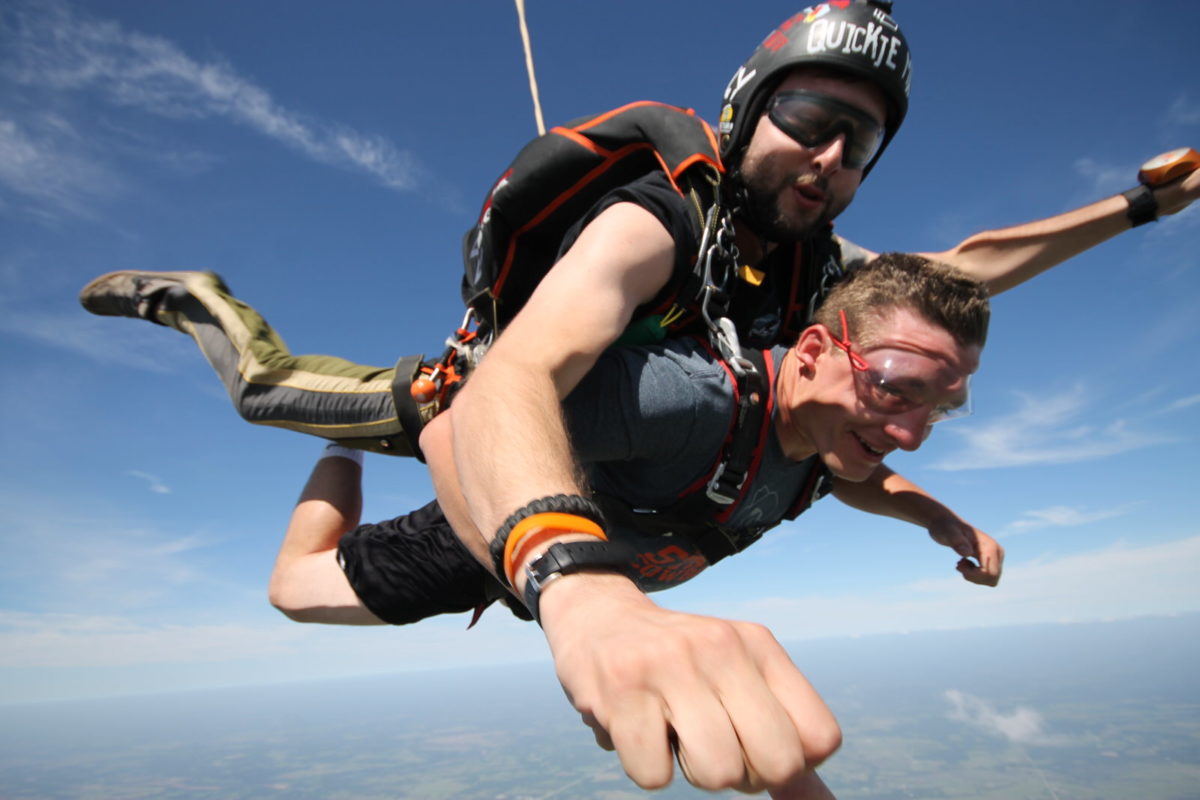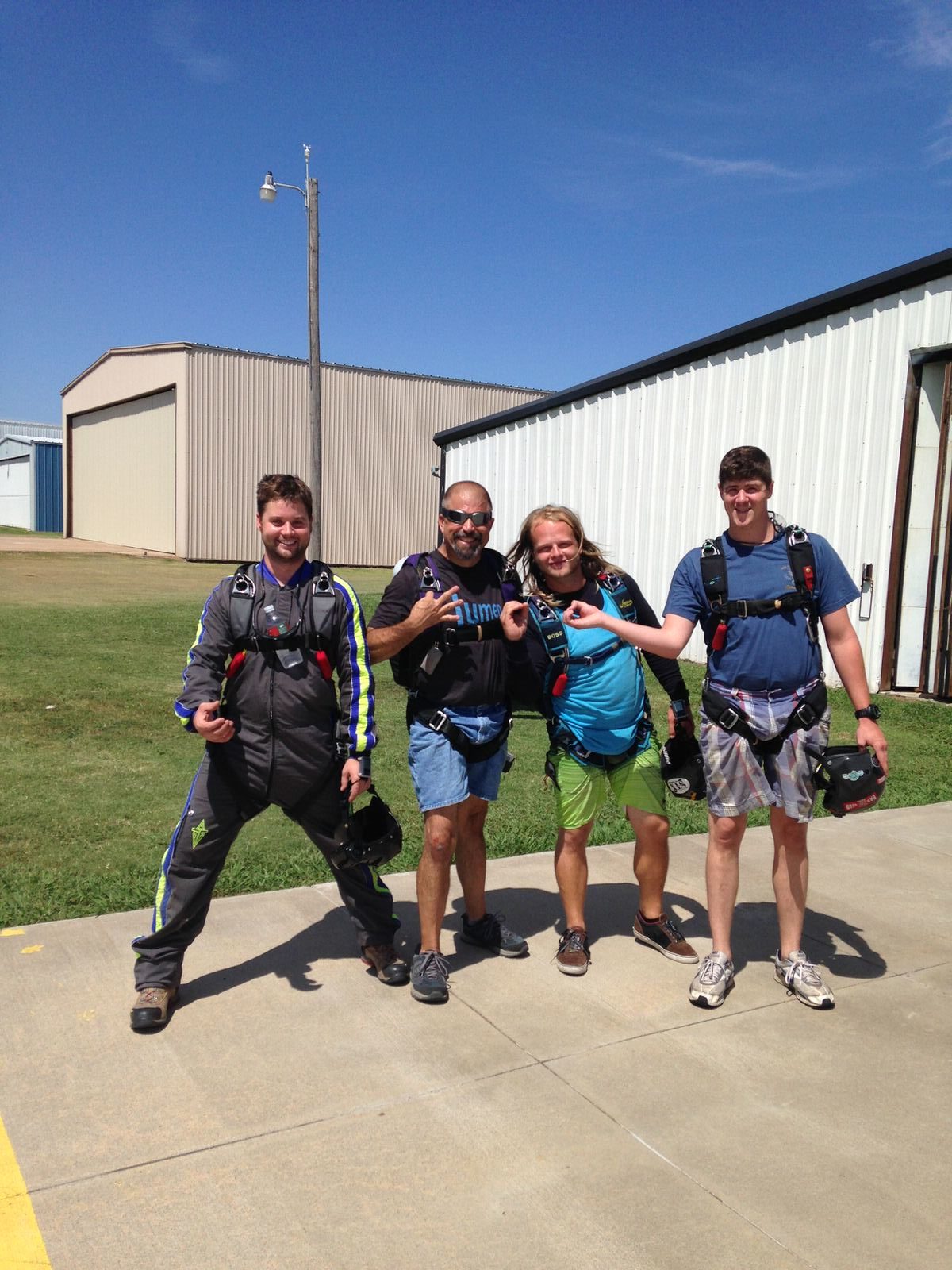Who Can Skydive?
Monday, July 29, 2024
Imagine the rush of wind as you’re freefalling through the skies, thousands of feet above the earth. Skydiving isn’t just for those looking for an adrenaline high – it’s a liberating journey open to anyone willing to take the risk to experience something more in life.
From adrenaline junkies to those seeking an escape from the mundane, many crave the taste for adventure and the challenge or desire to conquer fears despite age, gender, and physical ability. The sky welcomes all who dare to dive! However, keeping safety as top priority, there are certain requirements to fulfill before you can skydive. Let’s get into it.
Age Requirements

At Oklahoma Skydiving Center – and any other dropzone that is also in compliance with the United States Parachute Association (USPA) – the minimum age for skydiving is 18 years old. Celebrating an 18th birthday with a skydive is highlighted as a unique and memorable experience by jumping into adulthood! And hear this: you’re never too old to skydive!
There are many other countries (and a few non-USPA dropzones in the U.S.) that permit younger individuals to skydive. Age limits are as low as 12 in places like Australia and Germany, and there’s no minimum age in New Zealand – as long as the child fits the harness, they’re presumed good to go!
For those under 18 in the US, indoor skydiving offers an alternative way to experience the thrill of freefall without jumping out of an airplane. Most wind tunnels permit participants as young as three years old to make an indoor skydive! If you or your child are dreaming of being a skydiver one day, the wind tunnel is a great tool to help them prepare for the real thing.
Weight Requirements
The weight requirement varies from dropzone to dropzone and depends on: the type of gear being used, the airplane weight limit, and the weight of their instructors. At Oklahoma Skydiving Center, the weight limit for skydiving is 250 lbs. For participants weighing over 200 lbs, an additional fee of $1 for each pound over 200 will be applied. This policy is in place for safety and comfort reasons for both the skydiver and the instructor during the tandem jump.
Each tandem gear manufacturer places weight limits on the gear and anything exceeding that limit could damage the gear, affect parachute performance, and impact the overall stability during the jump. For an instructor to handle greater weights underneath a parachute requires extra precautions, adjustments, and strength to operate the equipment and handle procedures properly. Exceeding the weight capacity can pose risks and discomfort, which is why gear manufacturers and skydiving centers implement these guidelines.
Health & Physical Requirements

While skydiving doesn’t necessarily require peak physical fitness, it does demand a basic level of strength, flexibility, and mental alertness. Participants need to be able to crouch and kneel to board and navigate the aircraft, maintain correct body position during free fall, follow instruction, and have the physical strength to their legs during landing.
People with certain physical limitations or medical conditions, especially those related to the heart, back or neck, should consult with a physician before skydiving. Despite these specific requirements, our goal is to make skydiving accessible to everyone. Most individuals, including amputees, paraplegics, and those with certain disabilities are totally capable of skydiving with a doctor’s permission, of course! We have the ability to make some special accommodations for individuals on a case-by-case basis – give us a call to discuss your particular needs.
Mental & Emotional Preparedness
Mental preparedness is just as important as being physically prepared for jumping out of a perfectly good airplane. You’ll need to be mentally cognizant enough to understand and properly execute instructions from your tandem instructor. Which also means being totally sober; being under the influence of drugs or alcohol can interfere with judgment and motor skills.
Overcoming skydiving anxiety involves acknowledging that fear is normal and can be managed. Learning about the equipment, procedures, and familiarizing yourself with the dropzone can significantly reduce anxiety.
For example, understanding that each parachute system includes a reserve parachute packed by a certified parachute rigger can help ease your worry. And learning about the automatic activation device (AAD) that triggers deployment of the parachute if your instructor doesn’t manually deploy it is certainly reassuring. Embracing fear as a natural protective response and practicing regular exposure to challenging situations can help in building resilience and calmness, both in skydiving and in daily life. You got this!
Who Should Not Skydive?

Skydiving is not a good idea for individuals with specific medical conditions, including heart issues (such as hypertension or arrhythmia), back or neck injuries, or pregnancy.
Those with neck and spine problems could exacerbate their condition due to the physical demands of skydiving, including rapid deceleration and freefall body positions. Similarly, those with heart conditions may face severe risks from the adrenaline and the physical strain of skydiving.
While many experienced skydivers continue to skydive through their pregnancy, there are certain risks involved, especially for inexperienced and tandem skydivers. Hormonal changes can make joints more prone to injury and the physical demands of skydiving can be potentially harmful to the baby.
Other conditions, such as epilepsy, diabetes and asthma, may also be a cause for concern. With that being said, we are not doctors, we’re skydivers! It is important to consult a physician about any health concerns you may have before attempting a skydive. While we would love for everyone to experience skydiving, our highest priority is your safety and if doc doesn’t give you the go ahead, it’s going to be a no from us, too!
Should I Go Skydiving?
Skydiving is a thrilling experience that offers each person a unique chance to view life from a whole new perspective. To recap – participants must be at least 18 years old, possess a valid government-issued ID, weigh under 250 lbs, and be physically approved to skydive if they have any underlying medical conditions. If you check all of the boxes and are ready to conquer your fear, accomplish something amazing, and feel on top of the world – then you absolutely SHOULD go skydiving!
Book your skydive with Oklahoma’s most experienced dropzone, Oklahoma Skydiving Center! Blue skies, friends.
Copyright © 2025, Oklahoma Skydiving Center, All Rights Reserved.
DropZone Web Design & Marketing by Beyond Marketing, LLC





